By Riley Rath
Table of Contents
- What is D&D 5e HP?
- How Do You Calculate HP in D&D 5e?
- What is a Hit Die?
- Increasing Your Maximum HP in D&D 5e
- Restoring HP in D&D 5e
- Long and Short Rests
- Class Abilities
- Healing Spells
- Healing Potions
- Optional Rules: Massive Damage and Lingering Injuries
- Temporary D&D Hit Points
- FAQ
- Conclusion
New to D&D and TERRIFIED your character will get obliterated by a giant's mace or consumed by dragon fire?
Sounds like you are looking to understand Hit Points (HP) in D&D 5e!
This post breaks down everything related to Dnd 5e HP.
How to calculate your hit points... how to increase your max health... sources of temporary HP... spells and bonuses to HP... you name it, we got it.
So whether you're a seasoned player or just starting out, this guide is sure to provide you with all the information you need to master the art of Hit Points in D&D 5e.
What is D&D 5e HP?
If you have ever played a game like Pokémon, then you are already familiar with the use of hit points (often referred to as HP).

In Dungeons and Dragons... HP = "Hit Points" = your player character's health.
Less hit points... the lower your physical endurance and mental durability... the harder it is to survive deadly adventures.
No hit points... you dead.
HP is the game's measurement of a character's ability to withstand physical and mental damage during combat in D&D.
In general, when a creature is hit with an attack, hit points are subtracted from them, meaning they are closer to defeat. On the other hand, healing someone restores hit points, meaning they can go on for longer.
It doesn't matter if that damage is from a sword, a spell, a migraine, or just falling off a cliff... all damage taken reduces your hit points.

© Efflam Mercier
If you play a close-combat character, you will have to get up close and personal with an enemy. This means you may have to sacrifice some of your hit points to deal damage of your own. Squishy characters, however, have less hit points, so they usually hang back from the fight and help from afar. A properly balanced party will often have both types of characters to help balance healing and damage on the field.
Regardless of what kind of character you create, managing HP is preeeeeetty important if you want to make it past level 1!
How Do You Calculate HP in D&D 5e?

First thing's first... you gotta figure out how much HP your character has.
Max HP is the number of hit points your player character can have at any given moment.
To determine this value, follow these steps:
Step 1: Find your character class's hit dice in the Player's Handbook (PBH).
Step 2: Find your character's Constitution (CON) ability score and ability modifier on your character sheet.
Step 3: For level 1, add the highest number on your hit dice to your constitution modifier.
Step 4: For every level you gain after 1, roll your hit dice and add your CON ability modifier.
For example, a level 1 barbarian has a CON modifier of +2 and a 1d12 hit die. To calculate this, we just add these numbers together. 12 + 2 is 14, so the level 1 barbarian has 14 max hit points.
You probably noticed a couple things here...
- A) The higher the hit dice, the more potential for HP
- B) Hit dice are a gamble... an average roll is good, but you might roll a 1!
- C) Your CON modifier is the only promise you have when determining your HP.
Basically, you gain dnd hit points per level-up, so it is advisable to have at least a +2 modifier for your CON stat... you gotta make sure you get something!
What is a Hit Die?
In D&D 5e, a Hit Die just refers to which die in the 7-dice set you use when determining your hit points. You roll it to figure out how much health a character gains when leveling up and during short rests.
Awesome Dice Image
Each class has a specific hit die, and the number available is based on level. Fore example, the hit die of a barbarian is a 12-sided die (d12), the highest. And if they are a level 6 barbarian, they have 6 hit dice. And the hit die for a wizard is a 6-sided die (d6), which is the lowest. And if they are a level 12 wizard, they have 12 hit dice.
Players regain half of their missing hit dice after each short rest.
Check Out Our DnD 7-Dice Sets
We have One for Every Character!
Increasing Your Maximum HP in D&D 5e

© Fantasy Fight Games & Middle-earth Enterprises
As you adventure throughout the Forgotten Realms, you will face bigger and badder bosses that will deal even deadlier damage.
Which is why so many D&D players bend over backwards to find ANY other way to increase their max HP. After all, a SINGLE hit point can mean the difference between soldiering on and lying unconscious at death's door!
We have already covered leveling up, but that is the same for every character class in the game. There are a few subclasses, races, feats, and magic items that can be used to permanently increase your max hit points.
Class Bonus Abilities
If a player chooses the Draconic Bloodline subclass for their sorcerer, they have a "draconic resilience" feature that adds a hit point every time they level up. Oh the perks of having ancestors that were dragons!

The barbarian Path of the Totem (bear) doesn't increase your max HP... but it does make them EFFICIENT AF. When you rage, you are resistant to all damage except psychic... which basically DOUBLES YOUR MAX HP... hence the "unkillable" stereotype.
The ranger Beast Master subclass allows your ranger character to take on an animal companion with their own stats and HP. This doesn't increase your character's HP, but it does increase the amount of hit points you, the player, have to work with!
Psst. If you are looking for your own D&D fantasy pet, read this now!
But the most effective... and "sneakiest"... way to increase your HP is with a Circle of the Moon druid. These druids can shapeshift into high Challenge Rating (CR) animals. And every time they shapeshift, they take on the animal's HP.

© Sam Peterson
So if a level 4 druid shapeshifts into a Dire Wolf and a Tiger, they will gain an additional 74 hit points per short rest!
Racial Abilities
The half-orc race has an ability that doesn't literally increase a character's max HP... but it basically does.
When a half-orc's HP goes down to 0, their "Relentless Endurance" kicks in, which IMMEDIATELY bounds them back to 1 HP.
It doesn't matter how much damage the attack did... they "didn't hear no bell," and are back in the action by the next round (barely).

© Comedy Central
Hill Giant's have a similar ability to those draconic sorcerers... their heartiness from living in the foothills and carving their homes into the earth gives them +1 HP every time they level up.
Feats

The only feat that directly impacts hit points is the Tough feat. It is notoriously simple... but effective. It grants you 2 additional hit points for every level your character has reached, and increases again when they level up.
The Durable feat doesn't impact max health... but it DOES impact your hit dice. It not only lets you sometimes double your CON modifier, but bumps your Constitution ability score, which in turn will increase your HP every time you level up.
And lots of feats bump your CON: Crusher, Dragon Fear/Hide, Dwarven Fortitude, Infernal Constitution, Orcish Fury, Second Chance, and Tavern Brawler.
Magic Items

© Wizards of the Coast
There are several magic items that increases your max HP, most of which by increasing your CON ability score. Guildsbounty on stack exchange kindly compiled this for everyone:
- Amulet of Health: wear the amulet... bump CON to 19
- Berserker Axe: you not only kill people with this axe, but it makes you 1HP/level harder to kill!
- Manual of Bodily Health: Meditate on its wisdom, practice its disciplines, increase CON by 2.
- Belt of Dwarvenkind: gain the durability of a dwarf!
- Ioun Stone of Fortitude: pink stones swirl around your head... kinda weird, but increases CON
Restoring HP in D&D 5e
Your character is an adventurer... they face terrifying monsters, evil necromancers, hordes of orcs, and deadly traps.
So... yeah... they're gonna lose some HP.
I don't care that your Armor Class as a Tortle is your shell defense and plate armor... or how high your rogue's dexterity score is: you WILL take damage.
Thankfully, you do not have to conserve your HP for an entire campaign... your hit points can be replenished and recharged.
Here are the most popular ways:
Long and Short Rests

© Gavin O'Donnell
Rests are the primary way that player characters regain their health... but that wasn't always the case. In the earliest editions, you only regained 1 HP every day, no matter how much you rested! Back then, a healer was a NECESSITY for any serious party.
But in Dungeons and Dragons Fifth Edition, that is not the case:
Long Rest: if a character takes 8 hours of unconscious rest, they regain ALL lost hit points and return to their maximum.
Short Rest: if a character spends an hour in low-energy activity, they can choose to roll some of their hit dice to regain health. You can roll any number of hit dice available to you. For each die rolled, add the result and your CON modifier together, then add that to your current HP.
Class Abilities

Ok... full disclosure... LOTS of classes have SOMETHING that allows the character to regain some HP... so I'm going to just go over the BIG one for each class.
Paladin - Lay on Hands: You have a pool of HP equal to 5x your level that you can use to restore your HP or others'.
Warlock - The Dark One's Blessing: Invocation that allows you to steal health when you kill someone.
Fighter - Second Wind: Basically lets the fighter "rub some dirt in it" and regain HP
Ranger - (no class abilities... but there is always Good Berry!)
Artificer - Their iconic "Infuse Item" ability allows them to craft and carry healing spells everywhere (specifically the Alchemist).
Cleric - The quintessential healing class... lot of options... but particularly the Grave and Life Domains.
Monk - Way of Mercy: Instead of punches, use healing touches! 1 Ki pt = Martial Arts die + your Wisdom modifier of healing HP.
Wizard - School of Abjuration: Absorb damage and redistribute it as HP.
Druid - Lots of healing spells, and choosing the Circle of Dreams allows you to roll a pool of d6 to heal anyone within 120 feet.
Sorcerer - Divine Soul: Enhances your healing spells if allies are within 5ft of you.
Bard - Song of Rest: Sing a lullaby that makes everyone relax so hard they gain extra health.
Barbarian - NONE. Why heal when you can just soak up ALL the damage?
Healing Spells

Awesome Dice Image
D&D 5e usually has looooooooooots and lots of magic. And sometimes it is a good idea to use that magic to heal up rather than enchant the barkeep into giving you a 10% discount on ale. Here are some of the most common healing spells:
- Cure Wounds: the basic healing spell... pat your friend on the back... give them health.
- Healing Word: less health than Cure Wounds, but takes only a BONUS ACTION (very important) AND you can heal them from a distance rather than having to make physical contact.
- Prayer of Healing: takes ten minutes to cast... so not really something you can do in combat (unless you are fighting some evil sloths)... but allows you to heal the whole party with only a 2nd level spell slot.
- Revivify: A MUST for any party that doesn't ever want to die. It says it's necromancy... but it is an unequivocal good.
Healing Potions

There are good reasons why experienced DnD players NEVER set out on a quest without a spare healing potion on EVERY single party member. Because sometimes you can't wait until after the fight to heal... and sometimes you can't rely on your Cleric to spend an action and spell slot to heal you up... sometimes you have to rely on yourself.
If a character drinks a health potion, it requires an action (yes... an action... NOT a bonus action) when used in combat. The HP regained depends on the healing potion used:
- Potion of Healing: 2d4 + 4
- Potion of Greater Healing 4d4 + 4
- Potion of Superior Healing: 8d4 + 8
- Potion of Supreme Healing: 10d4 + 20
Optional Rules: Massive Damage and Lingering Injuries

Technically, these are OPTIONAL rules... but they are quite popular and extremely relevant for players wanting to stay alive.
When a player (or a monster... fair is fair) takes damage, there are two things you need to know:
1) If the damage taken is more than half of your total HP, you need to succeed on a DC 15 Constitution saving throw. If failed, the Dungeon Master (DM) can roll on a random 'massive damage' table (DMG 273).

© Wizards of the Coast
But that's not all: if you receive a ton of damage... and you fall below zero HP... and the amount of damage left is STILL greater than your max HP... YOU DIE.
No death saving throws... no time for healing spells... you just DIE.
It's a rule to make sense of catastrophic situations, like a level 1 halfling being stomped on by a Tarrasque.

© Warner Bros. Interactive Entertainment
Another option rule is Lingering Injuries (DMG 272)... which can be applied (or randomly rolled) when a player takes a critical hit, is reduced to 0 HP, or fails a death saving throw by 5 or more.
This can result in a player character receiving PERMANENT wounds... like reduced speed or the loss of a limb.

© André Meister
Temporary D&D Hit Points
Sometimes your character will run into some really cool magic that doesn't forever raise their HP... and it doesn't heal them... but it temporarily boosts their total hit points.
What are temporary hit points?
Temporary hit points are a separate pool of hit points you receive in addition to your character's total HP. These temporary hit points cannot be restored. However, they can be replenished if the magic effect occurs again.

Awesome Dice Image
WARNING: temporary HP does NOT stack; only the highest amount is applied at any given time!
Restoring HP is a lot more popular in Dungeons and Dragons than preemptively gaining extra hit points, so there aren't as many ways to gain temporary HP. But here are the ways you can gain a lil' extra health before a big fight:
Inspiring Leader (feat): Give a big speech before a battle.
Aid (2nd level spell): Increase HP for 3 friends by 5 points for each level you cast after level 2 (REALLY good).
False Life (1st level spell): Gain 1d4 + 4 HP for 1 hour
Druid Circle of the Shepherd (subclass): If you summon the Bear Spirit Totem, everyone in a 30ft radius of the spirit gains temporary hit points equal to 5 + your druid level.
Heroism (spell): Some temporary HP... but more importantly... immune to being frightened.
Storm Herald Barbarian (subclass): Rather than channeling rage into axe swings, rage is channeled into a swirling, 10ft aura that grants 2 temporary HP when activated (Tundra only).

Armor of Agayths (spell): Magical energy gives you 5 HP and deals 5 HP to any melee attack that hits.
Hero's Feast (6th level spell): This spell means business, and the 1d10 temporary HP is the smallest benefit: immune to fear, cured of all diseases, and advantage on wisdom saving throws.
Looking for the absolute BEST way to get max HP? check out this reddit thread.
FAQ
How Does multi-classing Affect Hit Dice?
Multi-classing is when your player character splits levels between multiple different character classes. But what do you do if those classes have different hit dice? Easy: for every level of that class, you use that class's hit dice.
What is Level 1 HP in 5e?
Your level 1 HP is your CON modifier + the max roll of your hit die.
How much HP should a NPC have?
It should say so on the stat sheet, but if they are a basic civilian? I would give them around 10 HP... enough to survive one blow from a goblin.
What are "Current Hit Points"?
Your current hit points are how many hit points you have to spare at this exact moment. If this number drops to zero, you can face death or falling unconscious. When the party's healer asks "How are your hit points looking?" this is the number to which they are referring.
When Do I Roll for Health?
Most DMs will want you to roll your hit die in front of everyone, and others will ask that you take advantage (which is in the Player's Handbook under your Class Features).
>
DND 5e HP... It's Pretty Straight Forward

Awesome Dice Image
HP = health. And your character's health is important. You have to build a character with as many hit points as possible, defend so you don't lose HP, and take action to regain HP when you need.
And with these tips on how to increase your max HP through leveling up, feats, class abilities, and magic items, you'll be better equipped to face the challenges of the dungeon.
So what are you waiting for? Dive into our Ultimate Guide to HP in D&D 5e now!
Riley Rath

Riley is a freelance tabletop games copywriter, content writer, and marketer based out of Spokane, WA. When not playing or writing about board games or DnD, he is busy with family, hiking, cooking, and gardening... very hobbit-like for a 6'4'' dude.







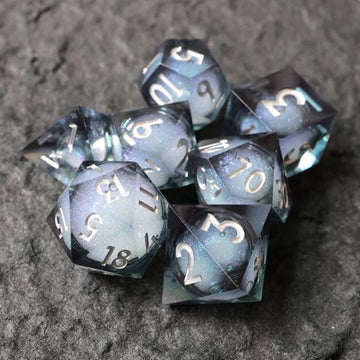
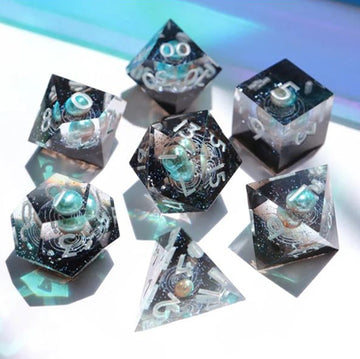
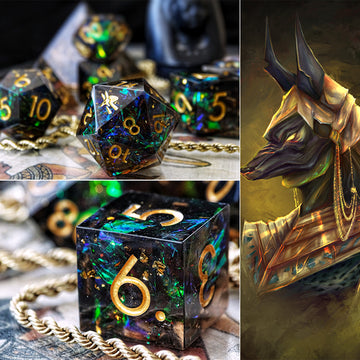
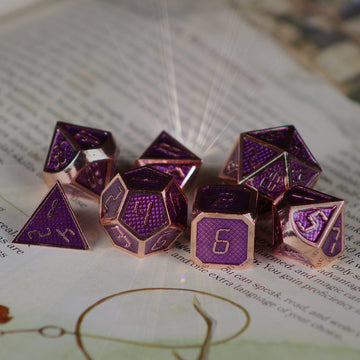
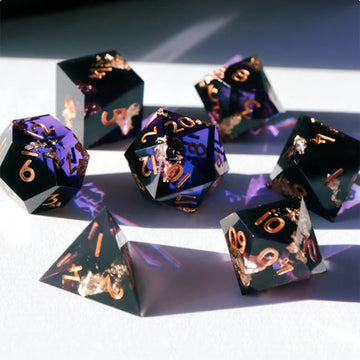
1 comment